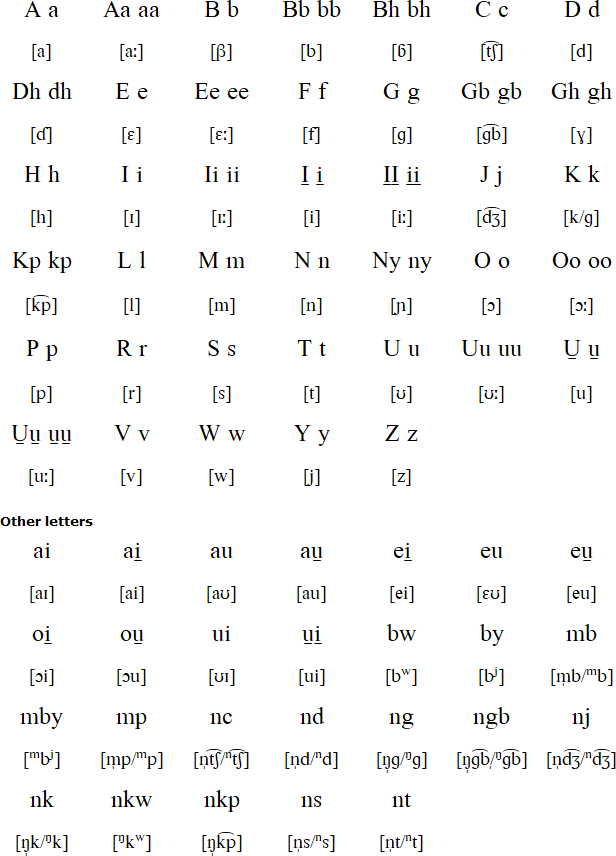Talinga is a Bantu language spoken by about 68,500 people in southwestern Uganda, and by about 30,000 people in the northeast of the Democratic Republic of the Congo. It is spoken particularly in the Bundibugyo District in the Western Region of Uganda, and in North Kivu Province of the DRC.
Talinga is known as Bwisi in Uganda, and Talinga in the DRC. Other names for the language include Talinga-Bwisi, Bwissi, Mawissi and Lubwissi. Bwisi speakers in Uganda call their language Lubwisi or Olubwisi, and themselves Babwisi, while in the DRC, Talinga speakers call their language Kitalinga. It is written with the Latin alphabet using an orthography developed in the 1990s by the Kwamba/Lubwisi Development Association of Uganda and SIL. Other orthographies are available.

Download an alphabet chart for Talinga (Excel)
Details of the Talinga alphabet (PDFs) provided by Wolfram Siegel
‘Orthography’ ni kighambo kya Lujungu ekikumani̱i̱si̱ya nkoleesi̱ya ya nuguta na bilaghilo bya mpandiika ya bighambo mu mu̱bu̱ghe. Mulingo ghwa mpandiika ghuni ghwamali̱ye kulengeesebuwa bhyani, kandi kitabo kini kyagu̱mi̱bu̱u̱we kuba mpandiika ya Lubwisi.
An orthography is a complete set of symbols and spelling rules used to write a language. This Spelling Guide has “Approved Orthography” status having been thoroughly tested for four years with “Working Orthography” status.
Source: Kitabo kya Kuhabula Kuhandiika Lubwisi (Lubwisi Spelling Guide). 2006.
Information about Talinga
https://en.wikipedia.org/wiki/Talinga_language
https://sw.wikipedia.org/wiki/Kitalinga-Bwisi_(lugha)
https://www.sil.org/system/files/reapdata/86/86/34/86863455789181866883856976278025335621/Bwisi_Spelling_Guide_3rd_ed_master_2011_3.pdf
https://glottolog.org/resource/languoid/id/tali1258
http://olac.ldc.upenn.edu/language/tlj
https://www.sil.org/resources/search/language/tlj
https://www.webonary.org/lubwisi/introduction/
Aka, Aushi, Bafaw-Balong, Bangi, Bangubangu, Basaa, Bemba, Bembe, Bena, Benga, Bhaca, Bila, Bube, Budu, Bujeba, Bukusu, Bulu, Bushong, Central Kilimanjaro, Central Teke, Chichewa, Chokwe, Chuwabu, Comorian, Dciriku, Digo, Duala, Eton, Ewondo, Fang, Fuliiru, Ganda/Luganda, Gogo, Gusii, Gwere, Gyele, Haya, Hehe, Herero, Ibinda, Idaxo-Isuxa-Tiriki, Ikizu, Ikoma, Jita, Kabwa, Kako, Kamba, Kanyok, Kiga, Kikuyu, Kimbundu, Kinyarwanda, Kirundi, Kisi, Kobo, Kogo, Komo, Kongo, Konjo, Koti, Kukuya, Kunda, Kuria, Kwambi, Kwasio, Lambya, Lengola, Lingala, Loma, Lozi, Luba-Katanga, Luchazi, Lunda, Luvale, Luyana, Makaa, Makonde, Makhuwa, Mandekan, Maore, Masaaba, Mbama, Mbere, Mbosi, Mbukushu, Mbunda, Mbuun, Mende, Mongo, Mpiemo, Mushungulu, Mwani, Myene, Nambya, Nande, Ngoni, Ngwii, Njebi, Nkore, North Teke, Northern Ndebele (South Africa), Northern Ndebele (Zimbabwe), Northern Sotho, Nyamwezi, Nyakyusa, Nyemba, Nyole, Nyoro, Nyungwe, Nzadi, Oroko, OshiWambo, Pagibete, Punu, Ronga, Safwa, Seki, Sena, Sengele, Shona, Soga, Songe, Southern Ndebele, Southern Sotho, Suba, Sukuma, Swahili, Swati, Taita, Talinga, Tanga, Tembo, Tetela, Tonga, Tooro, Tshiluba, Tsonga, Tswa, Tswana, Tumbuka, Umbundu, Venda, Vili, Vwanji, West Teke, Xhosa, Yakam, Yansi, Yao, Yasa, Yeyi, Zigula, Zinza, Zulu
Languages written with the Latin alphabet
Page created: 30.06.25. Last modified: 30.06.25
[top]
You can support this site by Buying Me A Coffee, and if you like what you see on this page, you can use the buttons below to share it with people you know.

If you like this site and find it useful, you can support it by making a donation via PayPal or Patreon, or by contributing in other ways. Omniglot is how I make my living.
Note: all links on this site to Amazon.com, Amazon.co.uk
and Amazon.fr
are affiliate links. This means I earn a commission if you click on any of them and buy something. So by clicking on these links you can help to support this site.
[top]